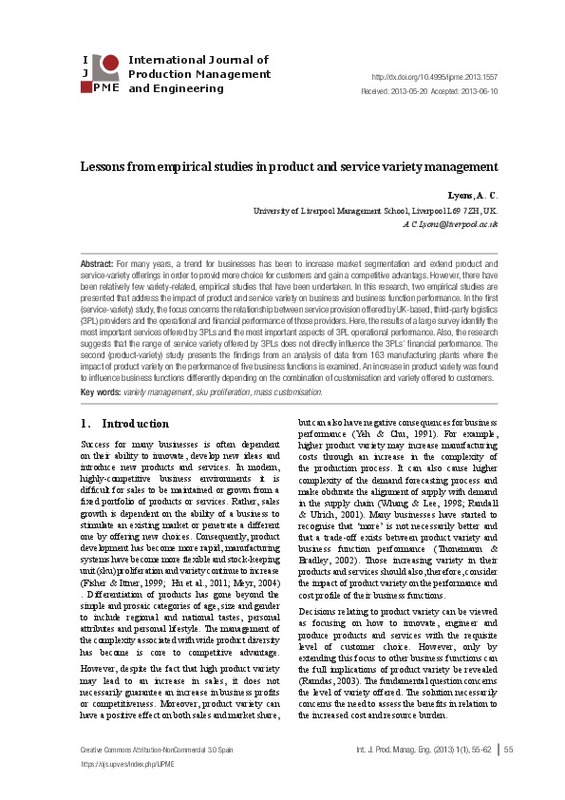JavaScript is disabled for your browser. Some features of this site may not work without it.
Buscar en RiuNet
Listar
Mi cuenta
Estadísticas
Ayuda RiuNet
Admin. UPV
Lessons from empirical studies in product and service variety management
Mostrar el registro sencillo del ítem
Ficheros en el ítem
| dc.contributor.author | Lyons, Andrew C.L.
|
es_ES |
| dc.date.accessioned | 2013-07-05T08:11:35Z | |
| dc.date.available | 2013-07-05T08:11:35Z | |
| dc.date.issued | 2013-07 | |
| dc.identifier.uri | http://hdl.handle.net/10251/30652 | |
| dc.description.abstract | [EN] For many years, a trend for businesses has been to increase market segmentation and extend product and service-variety offerings in order to provid more choice for customers and gain a competitive advantags. However, there have been relatively few variety-related, empirical studies that have been undertaken. In this research, two empirical studies are presented that address the impact of product and service variety on business and business function performance. In the first (service-variety) study, the focus concerns the relationship between service provision offered by UK-based, third-party logistics (3PL) providers and the operational and financial performance of those providers. Here, the results of a large survey identify the most important services offered by 3PLs and the most important aspects of 3PL operational performance. Also, the research suggests that the range of service variety offered by 3PLs does not directly influence the 3PLs¿ financial performance. The second (product-variety) study presents the findings from an analysis of data from 163 manufacturing plants where the impact of product variety on the performance of five business functions is examined. An increase in product variety was found to influence business functions differently depending on the combination of customisation and variety offered to customers | es_ES |
| dc.language | Inglés | es_ES |
| dc.publisher | Editorial Universitat Politècnica de València | |
| dc.relation.ispartof | International Journal of Production Management and Engineering | |
| dc.rights | Reconocimiento - No comercial (by-nc) | es_ES |
| dc.subject | Variety management | es_ES |
| dc.subject | Sku proliferation | es_ES |
| dc.subject | Mass customisation | es_ES |
| dc.title | Lessons from empirical studies in product and service variety management | es_ES |
| dc.type | Artículo | es_ES |
| dc.date.updated | 2013-07-04T11:27:10Z | |
| dc.identifier.doi | 10.4995/ijpme.2013.1557 | |
| dc.rights.accessRights | Abierto | es_ES |
| dc.description.bibliographicCitation | Lyons, AC. (2013). Lessons from empirical studies in product and service variety management. International Journal of Production Management and Engineering. 1(1):55-62. https://doi.org/10.4995/ijpme.2013.1557 | es_ES |
| dc.description.accrualMethod | SWORD | es_ES |
| dc.relation.publisherversion | https://doi.org/10.4995/ijpme.2013.1557 | es_ES |
| dc.description.upvformatpinicio | 55 | es_ES |
| dc.description.upvformatpfin | 62 | es_ES |
| dc.description.volume | 1 | |
| dc.description.issue | 1 | |
| dc.identifier.eissn | 2340-4876 | |
| dc.description.references | Ellinger, A. E., Ellinger, A. D., & Keller, S. B. (2002). LOGISTICS MANAGERS’ LEARNING ENVIRONMENTS AND FIRM PERFORMANCE. Journal of Business Logistics, 23(1), 19-37. doi:10.1002/j.2158-1592.2002.tb00014.x | es_ES |
| dc.description.references | Fawcett, S.E. & Smith, S.R. (1995). Logistics measurement and performance for United-States-Mexican operations under Nafta. Transportation Journal, 34, 3, 25-34. | es_ES |
| dc.description.references | Fisher, M. L., & Ittner, C. D. (1999). The Impact of Product Variety on Automobile Assembly Operations: Empirical Evidence and Simulation Analysis. Management Science, 45(6), 771-786. doi:10.1287/mnsc.45.6.771 | es_ES |
| dc.description.references | Lai, K. (2004). Service capability and performance of logistics service providers. Transportation Research Part E: Logistics and Transportation Review, 40(5), 385-399. doi:10.1016/j.tre.2004.01.002 | es_ES |
| dc.description.references | Liu, C.-L., & Lyons, A. C. (2011). An analysis of third-party logistics performance and service provision. Transportation Research Part E: Logistics and Transportation Review, 47(4), 547-570. doi:10.1016/j.tre.2010.11.012 | es_ES |
| dc.description.references | Meyr, H. (2004). Supply chain planning in the German automotive industry. OR Spectrum, 26(4). doi:10.1007/s00291-004-0168-4 | es_ES |
| dc.description.references | Murphy, P. R., Poist, R. F. (2000). Third-party logistics: Some user versus provider perspectives. Journal of Business Logistics, 21, 1, 121-133. | es_ES |
| dc.description.references | Stefansson, G., 2006. Collaborative logistics management and the role of third-party service providers. IJPDLM, 36, 76-92. | es_ES |
| dc.description.references | Ramdas, K. (2003). Managing product variety: An integrative review and research directions. POM, 12, 1, 79-101. | es_ES |
| dc.description.references | Randall, T., & Ulrich, K. (2001). Product Variety, Supply Chain Structure, and Firm Performance: Analysis of the U.S. Bicycle Industry. Management Science, 47(12), 1588-1604. doi:10.1287/mnsc.47.12.1588.10237 | es_ES |
| dc.description.references | Thonemann, U. W., & Bradley, J. R. (2002). The effect of product variety on supply-chain performance. European Journal of Operational Research, 143(3), 548-569. doi:10.1016/s0377-2217(01)00343-5 | es_ES |
| dc.description.references | Ward, J. H. (1963). Hierarchical Grouping to Optimize an Objective Function. Journal of the American Statistical Association, 58(301), 236-244. doi:10.1080/01621459.1963.10500845 | es_ES |
| dc.description.references | Whang, S. & Lee, H. (1998). Value of postponement in Product Variety Management: Research Advances, Boston: Kluwer Academic Publishers. | es_ES |
| dc.description.references | Yeh, K.H. & Chu, C.H. (1991). Adaptive strategies for coping with product variety decisions. IJOPM, 11, 8, 35-47. | es_ES |








